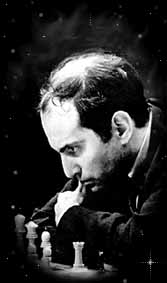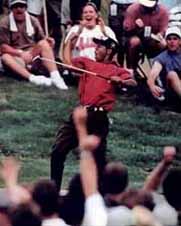 |
 |
 |
 |
 |
 |
 |
 |
 |
 |
 |
 |
 |
 |
 |
 |
 |
 |
 |
 |
 |
 |
 |
 |
 |
 |
 |
|
|
|
|
|
|
|
|
|
|
|
|
|
|
|
|
|
|
|
|
|
|
|
|
|
|
|
|
|
 |
|
|
|
|
|
|
|
|
|
|
|
|
|
|
|
Page 2… Lateral Thinking in Chess (Mark J.B. Bowen)
Modern fiction can inspire ideas also, a scene from a book in the Kane's War series describes a chess match as follows:
"Kane slid quietly into something he'd seen once at a game in New York. Guy there had called it the "No-Name Defense". Said he'd evolved it after studying the ancient Chinese military strategist, Sun Tzu."
Here the author, Nick Stone, has cleverly blended in an element of American Football with Chess and Oriental Military Stratagems. The No-Name Defense is legendary for bringing victory to the Miami Dolphins in the early seventies.
|
|
|
|
|
|
|
|
|

|
|
|
|
|
|
|
|
|
|
|
|
|
|
|
|
|
|
|
|
Studying other sports (as Kramnik did with ice hockey) is a very effective way to gain insights. Many chess players, including the great Spassky, find Tennis particularly interesting. The use of the serve is similar to the use of White pieces for instance. Do you have a favourite Soccer team ? Perhaps you could use their approach on the chess board also. What about your favourite players? Wouldn't it be great to play chess the way Michael Jordan plays basketball? Think about it and see if it helps your creativity.
|
|
|
|
|
|
|
|
|
|
|
|
|
|
The Latvian Mikhail Tal is known to be one of the most creative players of all time. He described his thoughts just before making a knight sac in a game, against Vasiukov (at Kiev, 1965), thusly:
"The sacrifice was not altogether obvious, and there was a large number of possible variations, but when I conscientiously began to work through them, I found, to my horror, that nothing would come of it. Ideas piled up one after another. I would transport a subtle reply by my opponent, which worked in one case, to another situation where it would naturally prove to be quite useless.
As a result my head became filled with a completely chaotic pile of all sorts of moves, and the famous 'tree of the variations', from which the trainers recommend that you cut off the small branches, in this case spread with unbelievable rapidity.
And then suddenly, for some reason, I remembered the classic couplet by Korney Ivanovich Chukovsky:
Oh, what a difficult job it was
To drag out of the marsh the hippopotamus.
|
|
|
|
|
|
|

|
|
|
|
|
|
|
|
|
|
|
|
|
|
|
|
|
|
|
|
|
|
I don't know from what associations the hippopotamus got onto the chessboard, but although the spectators were convinced that I was continuing to study the position, I, despite my humanitarian education, was trying at this time to work out: just how would you drag a hippopotamus out of the marsh? I remember how jacks figured in my thoughts, as well as levers, helicopters, and even a rope ladder.
After a lengthy consideration I admitted defeat as an engineer, and thought spitefully: 'Well, let it drown!' And suddenly the hippopotamus disappeared going off the chessboard just as he had come on. Of his own accord! And straightaway the position did not appear to be so complicated. Now I somehow realized that it was not possible to calculate all the variations, and that the knight sacrifice was, by its very nature, purely intuitive. And since it promised an interesting game, I could not refrain from making it.
And the following day, it was with pleasure that I read in the paper how Mikhail Tal, after carefully thinking over the position for 40 minutes, made an accurately calculated piece sacrifice…"
|
|
|
|
|
|
|
|
|
|
|
|
|
|
Use Lateral Thinking in Chess like the sword Alexander used to cut the proverbial Gordian Knot. Lateral Thinking, like chess itself, is not mastered in a day, but then nothing worthwhile ever is. Hopefully this article has served as "a finger pointing to the moon" of Creativity. (Speaking of the moon, did you check your horoscope today? You should because some players swear that even a knowledge of Astrology helps their chess.) Lateral thinking is a helpful tool to anyone seeking to improve their Chess.
Try it.
Written and copyrighted
by Mark J.B. Bowen
Saturday, March 30, 2002
|
|
|
|
|
|

|
|
|
|
|
|
|
|
|
|
|
|
|
|
|
|
|
|
|
|
|
|
|
|
|
|
|
|
|
 |
|
|
|
|
 |
|
|
|
|
|
|
|
|
|
|
|
|
|
|
|
|
|
|
 |
|




